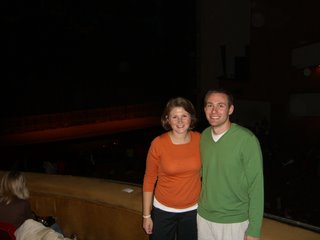More of Matt's Musings
 As I'm sure you've noticed, Alyson's posts tend to be very deep and focused. Mine are a little more, well, schizophrenic would be the right word. In that vein, here are more random things to enjoy:
As I'm sure you've noticed, Alyson's posts tend to be very deep and focused. Mine are a little more, well, schizophrenic would be the right word. In that vein, here are more random things to enjoy:A Trip to the Ballet
We went to the Russian State Conservatory for a performance of "Swan Lake." This is NOT the Mariinsky Theater, although it's right next door; we'll make it over there someday soon, but we haven't saved up enough money for our tickets yet! A two-minute clip of the ballet (we clandestinely taped it) is available by clicking here--it's a little bit boring at the beginning, but gets better later. We should charge you the 400-ruble ticket charge for watching it! (Just kidding...)
Learning Russian is Really Important
There are so many interesting opportunities for us to experience as Americans, but if we want to access real Jewish life here, we need to know Russian. For example, last week were invited to a fascinating meeting of volunteers for Adayin Lo. This is a major Jewish educational organization here in SPB: over its 16-year history, it has grown from a small group of children meeting informally in Genia Lvova's kitchen into a massive enterprise, with 7 locations throughout SPB. It has developed a group that is any Jewish organization's dream: a core of roughly 75 volunteers, generally between the ages of 16 and 20, who are almost all products of Adayin Lo's educational program, having come up through the ranks and are now excited to give back to the organization.
So here we are, sitting in this meeting, surrounded by about 40 of these inspiring young adults. Genia, now the organization's executive director, had generously been translating for us, but now she had to run the meeting. On our own, we were able to understand the questions posed to the group -- "What got you involved with Adayin Lo? How long have you been involved? What do you hope to receive from your volunteering here?" -- but the responses were indecipherable. Although we couldn't understand the exact words, we understood the general emotion: here was a group that was excited to be getting older, to come into their own as Jewish adults, and to spend their time and energy providing for the younger generation. This is what I mean when I talk about how Russian is critical to our experience: it is the key that will open up the door to understand more than just the question, but also its answer.
I Have a Confession to Make
OK, so now that you know how important Russian is, you'll understand when I confess that I'm a bit of a Russian dork. I'm always up for a challenge, and learning the world's third-hardest language (Finnish and Japanese are considered more difficult) is exactly what I'm looking for. In another post, I'll talk about why Russian is so difficult; for now, just know that solving the Middle East Crisis would be easier than learning to speak Russian fluently.
What makes me so nerdy? Well, I sit in front of the TV with a dictionary in my lap. I tend to read every ad on the street, looking for words I don't understand. When I find them, which is constantly, I write them in my PDA to look up in the dictionary when I get home. I also have these great flash-cards that have Russian on one side and English on the other (thanks, Shannon, for letting me borrow them!), and I bring them everywhere. Whenever I have a few minutes free, I'm flipping through these cards one after another, trying to learn useful words. And that's just the tip of the iceberg.
So my obsession with Russian is a little bit on the geeky side. But in my defense, if you lived in a society where you struggled to communicate effectively, wouldn't you do everything you could to learn the local language? For example, I had to go to three different grocery stores last night searching for pasta sauce; every time I tried to describe what I was looking for, the store clerks would point me to the ketchup! And besides, SPB has the world's deepest Metro system; when it's a full 2-minute ride down and back up the Metro's escalators, what else is there to do but read through your Russian flashcards?
The Search for Fun
In my quest to learn Russian, I've come across all sorts of interesting linguistic factoids. For example, Russian has a word for new buildings where construction has started but will never be completed because they ran out of money; apparently such buildings are common enough to deserve their own name!
On a different note, I haven't been able to find a word in Russian that directly coincides with "fun." Depending on who you ask, you'll get all sorts of answers...but when you delve a little deeper, you quickly find out that it's not really "fun" that they're describing. My friends and colleagues have suggested all sorts of similar words -- "interesting," "funny," "diversions," even "to take a walk"-- but I still haven't found "fun" here in Russia. The search continues...

1 Comments:
Ballet tickets, even to the Marinsky, should be cheap! Much less than 400 rubles...I hope you are aware of the dual price system for museums and theater...one price for Russians, one price (much more expensive) for foreigners. Make sure you are getting the local price for tickets to things. Buying in Russian certainly helps. Maybe have a Russian friend go with you to buy tickets?
Post a Comment
<< Home